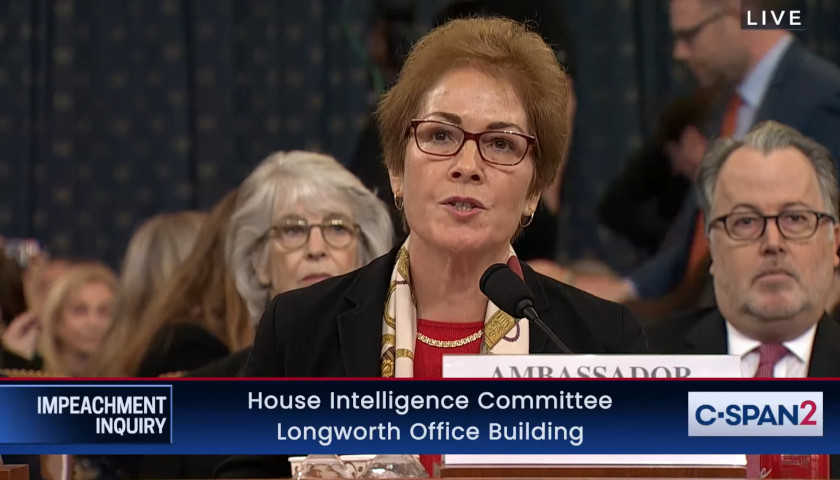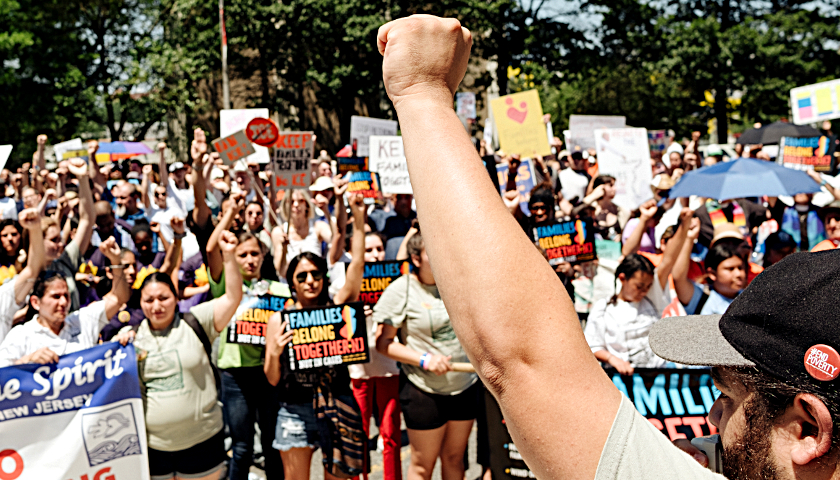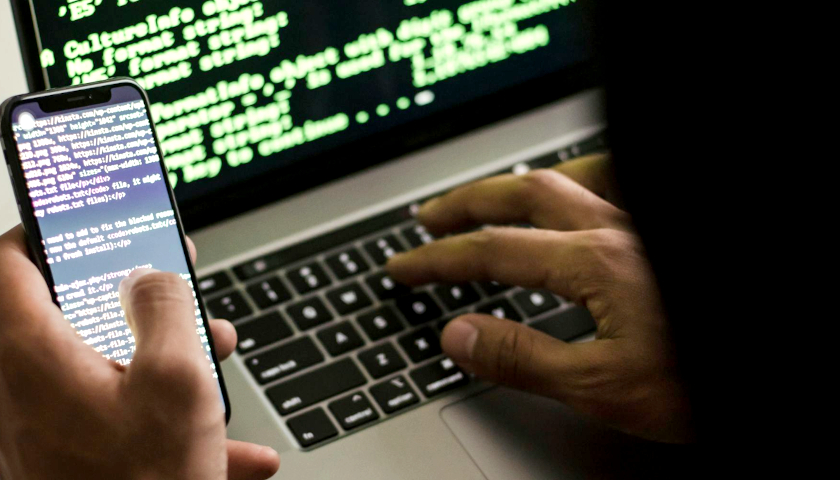by Fred Lucas
The Obama administration instructed her on how to respond to lawmakers’ questions about the lucrative employment of Vice President Joe Biden’s son by an energy company in Ukraine, the ousted ambassador to the former Soviet republic testified Friday.
Marie Yovanovitch, who was recalled and reassigned six months ago, also said she felt threatened by President Donald Trump’s phone call with the Ukrainian president in July, and she had a real-time exchange with Trump during the second day of House Democrats’ public impeachment hearings.
Yovanovitch, a career foreign service officer first assigned to Ukraine about two months before Trump’s election, testified for five hours before the House Permanent Select Committee on Intelligence.
Here are six of the big moments from Day Two.
1. Burisma, the Bidens, and the Fired Prosecutor
President Barack Obama nominated Yovanovitch to be U.S. ambassador to Ukraine in May 2016; she served there from Aug. 29, 2016, until being recalled by the Trump administration on May 20.
For her Senate confirmation hearing on her posting to Ukraine, she testified Friday, an Obama State Department briefing book prepared her to answer questions about the vice president’s son, Hunter Biden, and his employment as a highly paid board member for the Ukrainian energy company Burisma.
Although Yovanovitch, 61, said Hunter Biden’s role with Burisma represented a potential conflict of interest, she also said she had no objection to his father, as vice president, making U.S. aid to Ukraine conditional on the firing of a top state prosecutor investigating the company. She said she didn’t believe the firing was related to Burisma.
As it turned out, the Hunter Biden question didn’t come up in her 2016 confirmation hearing. But, she testified Friday, the Obama administration advised her to punt if senators did.
“It was something along the lines of ‘I would refer you to the vice president’s office,’” Yovanovitch said regarding the Obama State Department’s instructions to her.
Early during the House impeachment hearing, Rep. Elise Stefanik, R-N.Y., read directly from the transcript of closed-door testimony during the impeachment inquiry in which Yovanovitch said: “The way this question was phrased in this model Q&A [from the Obama administration] was ‘What can you tell us about Hunter Biden being named to the board of Burisma?”
Trump faces House Democrats’ impeachment inquiry largely because he asked the Ukrainian government to reopen an aborted investigation of Burisma and the Bidens while putting a temporary hold on nearly $400 million in U.S. military aid to Ukraine.
As vice president, Joe Biden was deeply involved in U.S. policy on Ukraine at a time when his son was earning at least $50,000 a month for sitting on the Burisma board, Trump’s defenders note.
Clearly, Stefanik said, Trump wasn’t the only one concerned.
“For the millions of Americans watching, President Obama’s own State Department was so concerned about potential conflicts of interest from Hunter Biden’s role at Burisma that they raised it themselves while prepping this wonderful ambassador nominee before her confirmation,” Stefanik said, referring to Yovanovitch.
“And yet, our Democratic colleagues and the chairman of this committee cry foul when we dare ask that same question that the Obama State Department was so concerned about,” she said, referring to Intelligence Chairman Adam Schiff, D-Calif.
Stefanik also asked the former ambassador: “In terms of defensive lethal aid, which you were an advocate for: That was not provided by President Obama. It was provided by President Trump.”
Yovanovitch replied, “That’s correct.”
Rep. John Ratcliffe, R-Texas, later asked whether the Obama administration prepared her to answer questions about any other companies in Ukraine.
“Out of thousands of companies in the Ukraine … the only one that you recall the Obama-Biden State Department preparing you to answer questions about is the one [where] the vice president’s son was on the board? Is that fair?” Ratcliffe asked.
“Yes,” the former ambassador said.
George Kent, deputy assistant secretary of state for European and Eurasian affairs, testified Wednesday that he raised concerns about a perceived conflict of interest because of the vice president’s son’s employment by Burisma. Yovanovitch said she agreed.
“I think it could raise the appearance of a conflict of interest,” Yovanovitch said of the younger Biden’s role at Burisma while his father was vice president.
Ratcliffe noted that Ukraine’s prosecutor general at the time, Viktor Shokin, had opened an investigation into Burisma before Yovanovitch became U.S. ambassador to Ukraine.
Ratcliffe referred to the former vice president’s recounting, in a January 2018 speech, that he had threatened the Ukraine government with losing $1 billion in U.S. aid unless Shokin was fired.
“Do you think that raises a potential concern or conflict of interest that the vice president of the United States was ordering the firing of a prosecutor in charge of [investigating] a company that has been identified as one that is substantially corrupt?” Ratcliffe asked.
Yovanovitch answered, “I actually don’t. I don’t think that the view that Mr. Shokin was not a good prosecutor general fighting corruption, I don’t think that had anything to do with the Burisma case.”
2. Invoking Benghazi
Yovanovitch blamed the president’s removal of her as ambassador to Ukraine on a concerted smear campaign by Trump lawyer Rudy Giuliani and others, including “some members of the press” in Giuliani’s circle.
“How could a foreign, corrupt interest influence our foreign policy? … This widens the playing field for autocrats like [Russian President Vladimir] Putin,” she told the House committee.
Yovanovitch said he was told by State Department officials that her removal was “not justified,” and that she “did nothing wrong” but had lost the confidence of the president.
She remains employed by the State Department, with no change in her pay, and currently teaches at Georgetown University, questioning revealed.
Yovanovitch received glowing treatment from committee Democrats, while Republicans either complimented her record in foreign service or at least were respectful in their questions.
At one point, Yovanovitch spoke broadly about the importance of ambassadors and the risks they take, invoking the Iran hostage crisis in 1979-80 and the deadly terrorist attacks of Sept. 11, 2012, on U.S. government facilities in Benghazi, Libya:
We are the 52 Americans, who, 40 years ago this month, began 444 days of deprivation, torture, and captivity in Tehran. We are the dozens of Americans stationed at our embassies in Cuba, and consulates in China whom mysteriously and dangerously, and perhaps in some cases, perhaps even permanently, were injured and attacked from unknown sources several years ago.
And we are Ambassador Chris Stevens, Sean Patrick Smith, Ty Woods, and Glen Doherty, people rightly called heroes for their ultimate sacrifice to this nation’s foreign policy interests in Libya eight years ago.
3. Trump Tweets, Yovanovitch Responds
Trump tweeted about Yovanovitch’s testimony at 10 a.m., less than an hour into it.
Everywhere Marie Yovanovitch went turned bad. She started off in Somalia, how did that go? Then fast forward to Ukraine, where the new Ukrainian President spoke unfavorably about her in my second phone call with him. It is a U.S. President’s absolute right to appoint ambassadors.
— Donald J. Trump (@realDonaldTrump) November 15, 2019
“Everywhere Marie Yovanovitch went turned bad. She started off in Somalia, how did that go?” Trump wrote in the tweet of the ambassador he recalled in May.
“Then fast forward to Ukraine, where the new Ukrainian President spoke unfavorably about her in my second phone call with him,” Trump continued. “It is a U.S. President’s absolute right to appoint ambassadors.”
Trump followed in another tweet: “They call it ‘serving at the pleasure of the President.’”
“The U.S. now has a very strong and powerful foreign policy, much different than proceeding administrations. It is called, quite simply, America First! With all of that, however, I have done FAR more for Ukraine than O,” he wrote, referring to his immediate predecessor, Barack Obama.
During the hearing, Schiff read these tweets out loud and asked Yovanovitch for a response.
With regard to Trump’s assertion of things turning bad everywhere she went, Yovanovitch said: “I don’t think I have such powers.”
“Where I served, I think we have made things better,” the former ambassador said. “In Ukraine, there was a huge problem with corruption. I think we made a lot of progress on that.”
Yovanovitch called Trump’s tweet about her “very intimidating,” adding: “I can’t speak to what the president is trying to do, but the effect is to be intimidating.”
Schiff, possibly seeing grounds for an article of impeachment, responded: “Some of us here take witness intimidation very, very seriously.”
Later in the day, White House press secretary Stephanie Grisham responded in a written statement.
“The tweet was not witness intimidation, it was simply the president’s opinion, which he is entitled to,” Grisham said. “This is not a trial, it is a partisan political process—or to put it more accurately, a totally illegitimate, charade stacked against the President. There is less due process in this hearing than any such event in the history of our country. It’s a true disgrace.”
4. First Trump-Zelenskyy Transcript
The White House released an official transcript Friday morning of the first call between Trump and Ukraine’s newly elected president, Volodymyr Zelenskyy.
The April 21 call preceded the now-famous July 25 call that set in motion the impeachment inquiry when an anonymous whistleblower flagged it. The White House released an official transcript of the second call in September, pushing back against the whistleblower’s narrative.
The content of the initial phone conversation between Trump and Zelenskyy was largely pleasantries, according to the new White House transcript.
Noting that Schiff mischaracterized and made up quotes from the July 25 call, the committee’s ranking member, Rep. Devin Nunes, R-Calif., read the newly released transcript of the April call into the congressional record.
In it, Zelenskyy tells Trump at one point: “You are, as I said, a great example. We are hoping we can expand on our job[s] as you did. … You are a great example for our new managers.”
Zelenskyy invites Trump to attend his inauguration, while acknowledging the American president is very busy.
Trump responds: “I’ll look into that. … We will have somebody at a minimum at a very, very, high level and they will be with you.”
Trump reportedly ordered Vice President Mike Pence to cancel plans to attend the Zelenskyy inauguration on May 20. Instead, Energy Secretary Rick Perry, European Union Ambassador Gordon Sondland, and Sen. Ron Johnson, R-Wis., represented the U.S.
Yovanovitch flew back to the U.S. that same day, she testified.
Several witnesses have said that Perry, Sondland, and special envoy to Ukraine Kurt Volker were known as the “three amigos” in charge of U.S. policy on Ukraine, working with Giuliani, the former New York mayor who is one of the president’s personal lawyers.
Trump also says in the April call: “When you’re settled in and ready, I’d like to invite you to the White House. We’ll have a lot of things to talk about, but we’re with you all the way.”
5. ‘It Sounded Like a Threat’
In his questioning of Yovanovitch, Democrats’ counsel, Daniel Goldman, cited the transcript of the July 25 phone call in which Trump tells the Ukrainian president that Yovanovitch was “bad news” and adds of the recalled ambassador that “she’s going to go through some things.”
“I was shocked, appalled, and devastated that the president of the United States would talk about any ambassador like that to a foreign head of state—and it was me. I mean, I couldn’t believe it,” she said.
“A person who saw me actually reading the transcript said that the color drained from my face,” Yovanovitch continued. “I think I even had a physical reaction. I think, you know, even now, words kind of fail me.”
When Goldman asked again, “What did you think when President Trump told President Zelenskyy that you were ‘going to go through some things’?”
“I didn’t know what to think, but I was very concerned,” she said.
Goldman, a former MSNBC commentator, asked: “What were you concerned about?”
Yovanovitch: “It didn’t sound good. It sounded like a threat.”
Goldman: “Did you feel threatened?”
Yovanovitch: “I did.”
Zelenskyy also spoke poorly of the former ambassador during the July 25 phone call, according to the official transcript.
“It was great that you were the first one who told me that she was a bad ambassador because I agree with you 100%,” the Ukrainian leader told Trump. “Her attitude towards me was far from the best, as she admired the previous [Ukrainian] president, and she was on his side. She would not accept me as a new president well enough.”
6. No Knowledge of Bribery
House Speaker Nancy Pelosi, D-Calif., accused Trump of bribery Thursday for allegedly withholding the nearly $400 million in congressionally approved U.S. aid to Ukraine while pushing Zelenskyy to investigate the Bidens and Burisma.
Speaking of the testimony Wednesday by two veteran foreign service officers during the first day of the public impeachment hearings, Pelosi said during her weekly press conference:
The devastating testimony corroborated evidence of bribery uncovered in the inquiry, and that the president abused his power and violated his oath by threatening to withhold military aid and a White House meeting [with Zelenskyy] in exchange for an investigation into his political rival—a clear attempt by the president to give himself an advantage in the 2020 election.
During the hearing Friday, Rep. Chris Stewart, R-Utah, asked Yovanovitch: “Do you have any information regarding the president of the United States accepting any bribes?”
“No,” she responded.
Stewart followed up: “Do you have any information regarding criminal activity that the president of the United States has been involved in at all?”
“No,” she said.
– – –
Fred Lucas is the White House correspondent for The Daily Signal and co-host of “The Right Side of History” podcast. Lucas is also the author of “Tainted by Suspicion: The Secret Deals and Electoral Chaos of Disputed Presidential Elections.”
Photo “Marie Yovanovitch” by CSPAN.





